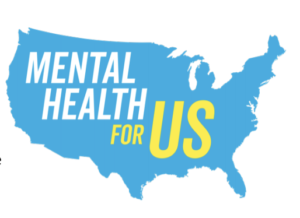
There’s no health without mental health—now it’s time to make sure policymakers know it too. Voting is one of our most important rights as American citizens. When we vote, our government begins to reflect the values of our community. If we truly want to change the way America cares for people living with mental illness and addiction, then we need to make our voices heard this November! Use the language and content below to empower your friends and family to vote for mental health this year!
Amplifying your voice online
Social media is a great tool to help others understand the importance of this election and make a plan to vote.
- Have you made a plan to vote yet? Sit down with your friends and family and decide how
you’re going to submit your ballots this November. Here’s a checklist to help you get
started: click here #MentalHealthforUS #Vote4MentalHealth - When we vote, our government begins to reflect the values of our community. That’s
why I’m voting for #mentalhealth on November 3. Join me and make your plan to vote
today: click here #MentalHealthforUS #Vote4MentalHealth - With 1 in 5 Americans living with a mental illness and 1 in 12 with addiction, it’s time for
our policymakers to prioritize prevention, access & intervention, and Recovery. Learn
more at click here #MentalHealthforUS - The @MHforUS coalition asked top presidential candidates what they have planned for
the future of #mentalhealth and #addiction care in America—learn what they had to say
before you turn in your ballot: click here #MentalHealthforUS
Raising awareness within your community
Email your friends and family!
Below is an email you can send to your friends and family encouraging them to become an
engaged, mental health voter. Feel free to personalize it with any information you feel
comfortable sharing about your own journey with mental health or addiction.
Engaging policymakers
Sample town hall questions
This movement is all about demanding policymakers take action on mental health and addiction within our communities—so we need to show up and speak out to let them know we care. The goal is to get policymakers “on the record” about what they will commit to do when they serve in office. One of the most effective ways to hold our elected officials accountable is to attend their virtual events and ask them about their plans for the future. Below are some sample questions you can ask candidates for elected office:
• Every hour, eight people in America die of drug overdose, from opioids and increasingly
from other drugs as well. What would your administration do to turn the tide on the
addiction crisis?
• Out of the millions of Americans living with mental health and addiction, less than half
received any treatment or support in 2017. What are your plans to improve access and
intervention so that all Americans can find affordable, effective treatment?
• Suicide is the 10th leading cause of death in the US and the second leading cause of death
for American youth. Every day, 20 Veterans die by suicide. What steps will you take to
prevent suicide?
• Rates of anxiety, depression, and suicidal behavior are all rising among our teens and
young adults, but the time from first symptoms (usually around age fourteen) to
treatment continues to be almost a decade for many people. What would you do to make
sure that more individuals get the help they need when they first need it?
• The Mental Health Parity and Addiction Equity Act (Federal Parity Law) was enacted in
2008, yet insurers continue to illegally deny coverage of care for mental health and
addiction treatment services. How will you ensure enforcement of the Federal Parity
Law?
When you attend these events, share what the policymaker said related to mental health and addiction issues on social media by tagging us and using the hashtag #MentalHealthforUS.
Talking about mental health and addiction
When talking about mental health and addiction, avoid stigmatizing language that perpetuates stereotypes about and discrimination of people with these conditions. The simplest way to do this is to use person-centered language.
Person-centered language is exactly what it sounds like—it focuses on the humanity of a person, rather than their diagnosis. It also means not placing blame or accusations on a person for their mental illness or addiction.
For example:
• Instead of “schizophrenic,” say “person living with schizophrenia”
• Instead of “addict” or “former addict,” say “person living with addiction” or “person in
recovery from addiction” or “addiction survivor”
• Instead of “she’s an anorexic,” say “she has anorexia nervosa”
• When discussing suicide, say “died by suicide” rather than “committed suicide.” The word
committed implies criminality, whereas suicide is a component of a condition.
